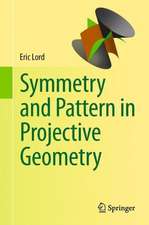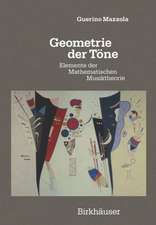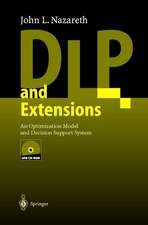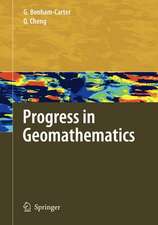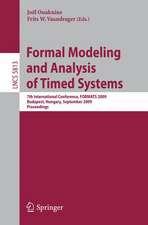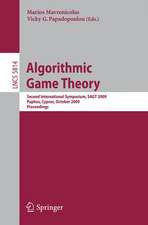Flow, Gesture, and Spaces in Free Jazz: Towards a Theory of Collaboration: Computational Music Science
Autor Guerino Mazzola Mathias Rissi Autor Paul B. Cherlin Nathan Kennedyen Limba Engleză Paperback – 14 noi 2014
| Toate formatele și edițiile | Preț | Express |
|---|---|---|
| Paperback (1) | 354.36 lei 38-45 zile | |
| Springer Berlin, Heidelberg – 14 noi 2014 | 354.36 lei 38-45 zile | |
| Hardback (1) | 388.13 lei 6-8 săpt. | |
| Springer Berlin, Heidelberg – 12 ian 2009 | 388.13 lei 6-8 săpt. |
Din seria Computational Music Science
- 24%
 Preț: 913.53 lei
Preț: 913.53 lei - 18%
 Preț: 726.85 lei
Preț: 726.85 lei - 20%
 Preț: 596.63 lei
Preț: 596.63 lei - 20%
 Preț: 589.20 lei
Preț: 589.20 lei -
 Preț: 388.13 lei
Preț: 388.13 lei - 15%
 Preț: 648.05 lei
Preț: 648.05 lei - 20%
 Preț: 326.32 lei
Preț: 326.32 lei - 20%
 Preț: 333.04 lei
Preț: 333.04 lei - 20%
 Preț: 335.52 lei
Preț: 335.52 lei - 20%
 Preț: 308.98 lei
Preț: 308.98 lei - 20%
 Preț: 597.29 lei
Preț: 597.29 lei - 20%
 Preț: 505.81 lei
Preț: 505.81 lei - 20%
 Preț: 504.98 lei
Preț: 504.98 lei - 20%
 Preț: 940.47 lei
Preț: 940.47 lei - 24%
 Preț: 745.83 lei
Preț: 745.83 lei - 24%
 Preț: 612.93 lei
Preț: 612.93 lei - 20%
 Preț: 501.20 lei
Preț: 501.20 lei - 20%
 Preț: 533.76 lei
Preț: 533.76 lei - 18%
 Preț: 725.92 lei
Preț: 725.92 lei - 15%
 Preț: 579.99 lei
Preț: 579.99 lei -
 Preț: 487.96 lei
Preț: 487.96 lei - 18%
 Preț: 1116.26 lei
Preț: 1116.26 lei
Preț: 354.36 lei
Nou
Puncte Express: 532
Preț estimativ în valută:
67.81€ • 72.51$ • 56.54£
67.81€ • 72.51$ • 56.54£
Carte tipărită la comandă
Livrare economică 14-21 aprilie
Preluare comenzi: 021 569.72.76
Specificații
ISBN-13: 9783642432842
ISBN-10: 3642432840
Pagini: 156
Ilustrații: XIII, 141 p.
Dimensiuni: 155 x 235 x 8 mm
Greutate: 0.23 kg
Ediția:2009
Editura: Springer Berlin, Heidelberg
Colecția Springer
Seria Computational Music Science
Locul publicării:Berlin, Heidelberg, Germany
ISBN-10: 3642432840
Pagini: 156
Ilustrații: XIII, 141 p.
Dimensiuni: 155 x 235 x 8 mm
Greutate: 0.23 kg
Ediția:2009
Editura: Springer Berlin, Heidelberg
Colecția Springer
Seria Computational Music Science
Locul publicării:Berlin, Heidelberg, Germany
Public țintă
ResearchCuprins
Getting off Ground.- What Is Free Jazz?.- Jazz in Transition.- The Landscape of Free Jazz.- Out of this World.- The Art of Collaboration.- Collaborative Spaces in Free Jazz.- Which Collaboratories?.- The Innards of Time.- Gestural Creativity.- Gestures: From Philosophy to Thought Experiments.- Geometry of Gestures.- The Escher Theorem and Gestural Creativity in Free Jazz.- What Group Flow Generates.- What Is Flow?.- The Symbolic Axis of Distributed Identity.- Epilogue.- From Pre-to Postproduction: The Infinite Listening.- Global Strategies for Free Jazz.- The Future of Free Jazz.
Recenzii
"Managing innovation and spurring team creativity while working under constraints are key ingredients for success in today’s industries. Surprisingly enough, there is an artistic domain in which such concerns are also paramount--jazz improvisation. While understanding how such multifarious collaborations can be encouraged and even nurtured is still a work in progress, this book offers some suggestions on how such endeavors can be approached and theorized, at least in the world of 20th century free jazz music.[...] In summary, the suggested line of thought about the science of collaboration is obviously still undergoing work, and some issues are somewhat abstruse. Anyone interested in the emergence of collaboration, be it in musical, artistic, or innovative processes, will get something out of this book." P. Jouvelot, ACM Computing Reviews, May 2009
"[This book] is at once a contribution to mathematical music theory, the first volume in a Springer-Verlag series on computational music science, and a manifesto on contemporary free jazz as a cultural achievement. ... As a manifesto on the music of a most gifted mathematician, or the mathematically inflected thought of a gifted musician, Mazzola’s book exhibits the kind of energy, vision and passion that he brings to his vocation, and we are richer for it." Charles Turner (2011): Book Review, Jazz Perspectives, 5:1, 105-109
"[This book] is at once a contribution to mathematical music theory, the first volume in a Springer-Verlag series on computational music science, and a manifesto on contemporary free jazz as a cultural achievement. ... As a manifesto on the music of a most gifted mathematician, or the mathematically inflected thought of a gifted musician, Mazzola’s book exhibits the kind of energy, vision and passion that he brings to his vocation, and we are richer for it." Charles Turner (2011): Book Review, Jazz Perspectives, 5:1, 105-109
Textul de pe ultima copertă
The scientific approach of this book transcends the limits of art literature in that it also develops geometric theories of gestures and distributed identities, also known as swarm intelligence.
We exemplify this approach in the framework of free jazz, which is a prototypical creative and collaborative art form. Leader artists such as John Coltrane, Pharoah Sanders, Cecil Taylor, Sun Ra, The Art Ensemble of Chicago, Albert Ayler, Don Cherry, and Archie Shepp are presented in their strongest works and theories.
The pillars of our theory of collaboration are built from psychologist Mihaly Csikszentmihalyi’s flow, physicist Gilles Châtelet’s gestures, and computer scientist Bill Wulf's collaboratories.
We exemplify this approach in the framework of free jazz, which is a prototypical creative and collaborative art form. Leader artists such as John Coltrane, Pharoah Sanders, Cecil Taylor, Sun Ra, The Art Ensemble of Chicago, Albert Ayler, Don Cherry, and Archie Shepp are presented in their strongest works and theories.
The pillars of our theory of collaboration are built from psychologist Mihaly Csikszentmihalyi’s flow, physicist Gilles Châtelet’s gestures, and computer scientist Bill Wulf's collaboratories.
Caracteristici
Includes supplementary material: sn.pub/extras



